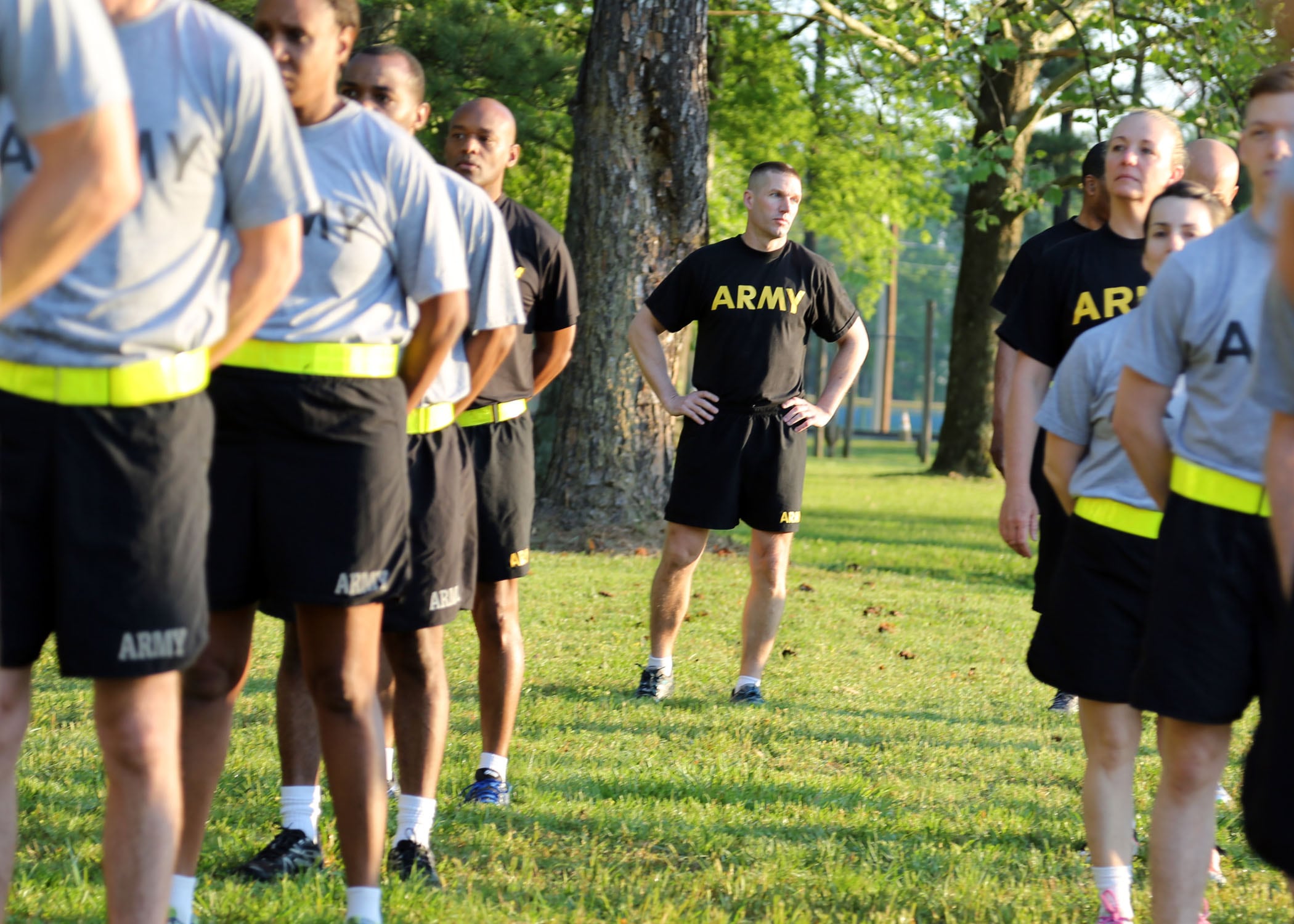You wouldn't think that moving the salad bar to the front of the chow hall and moving the dessert bar back 10 feet would make the Army healthier. But at Fort Campbell, Kentucky, that bumped up salad sales about 24 percent and dessert sales down 10 percent, a nudge toward goals of soldiers eating, exercising and sleeping healthier.
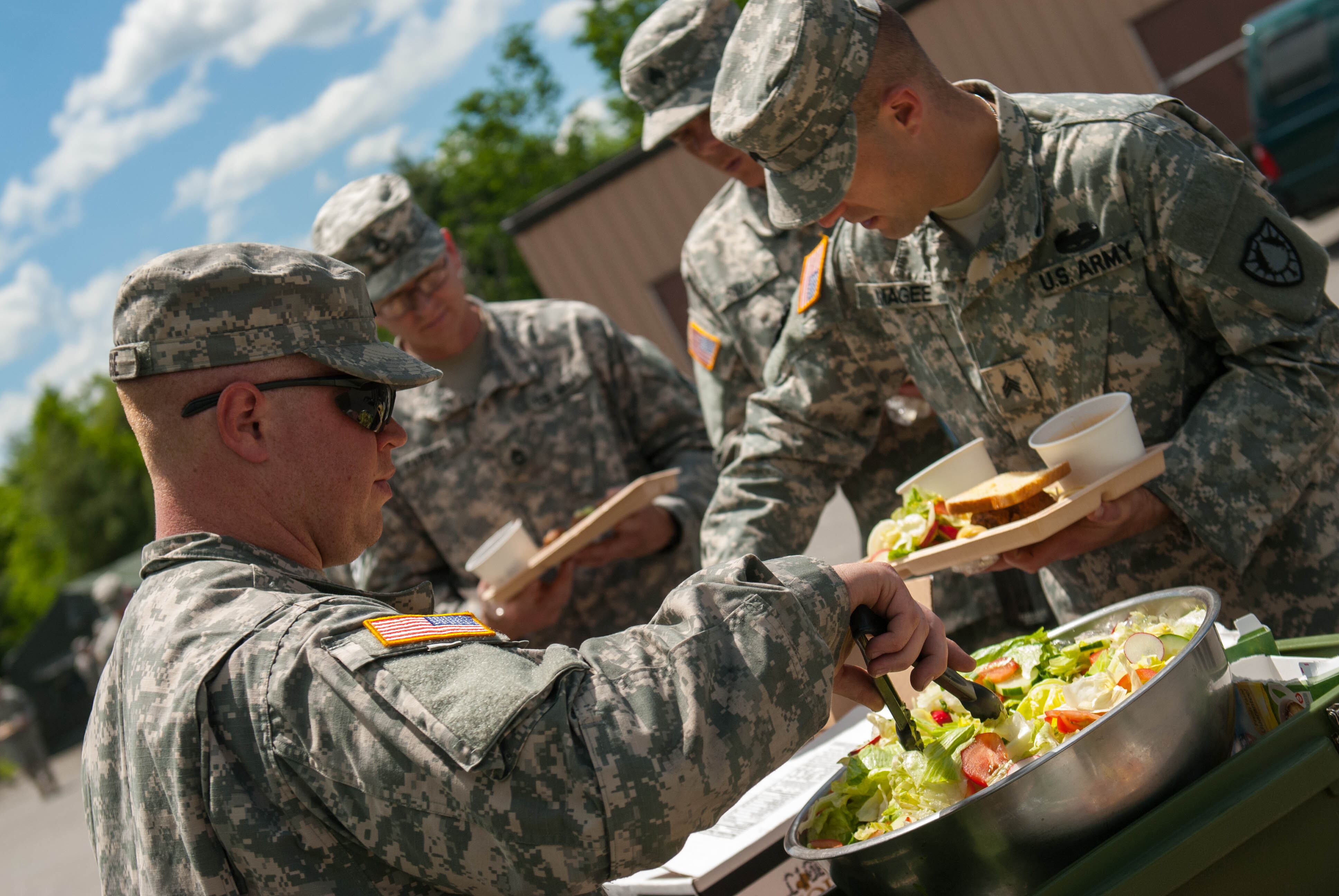
Soldiers from the 152nd Component Repair Company help themselves to salad after picking up a hot meal prepared for them by four cooks within the unit striving to move on to the national level for the Phillip A. Connolly Competition. Even though the unit is a component repair and maintenance company that works primarily on electronics equipment, light-medium tactical vehicles and heavy equipment, they still have to have the capabilities to feed their soldiers. (U.S. Army National Guard photo by Sgt. Angela Parady)
Photo Credit: Sgt. Angela Parady/Army
That’s just an example of the kind of change Army Medical Command hopes to inspire and successes it hopes to share across installations through its first annual Health of the Force report. At a media roundtable on Wednesday at the Defense Health Headquarters in Falls Church, Virginia, leaders who helped assemble it discussed its findings and repercussions, as well as efforts to improve Army health – an effort with significant readiness, capability and financial implications.
leaders who helped assemble it discussed its findings and repercussions, as well as efforts to improve Army health – an effort with significant readiness, capability and financial implications.
said the goal of the November report, which broke down data on various aspects of health by installation, was to inform and educate leaders. With the data they could know where their installation stood relative to the Army, and what changes have led to positive outcomes.
The Army hopes to reduce the figure of 17 percent of soldiers not medically deployable within 72 hours by learning from the report and adjusting. Teyhen, director of health and wellness for the surgeon general's office, said there was no "aha moment" regarding surprising data from the report, but did lay out four areas that stood out to her:
• The impact of musculoskeletal injuries: 180,000 soldiers amass 10 million duty days lost per year due to MSKIs per year, and accounting for 76 percent of the medically non-deployable population.
• Tobacco use: the rate in the Army (34 percent) outpaces the national average. According to the Center for Disease Control, less than 17 percent of American adults smoke and less than four percent use smokeless tobacco.
• The obesity rate: while lower than in the civilian population, obesity remains fairly high (13 percent) considering nominal height and weight standards of the Army. More than a third of American adults overall (34.9 percent) are obese, according to the CDC.
• Skimping on sleep: About 85 percent of soldiers are not meeting all recommended targets for sleep, often not because they can't but because they choose not to.
The overarching philosophy of these recent MEDCOM efforts is to improve overall health rather than play whack-a-mole with problems as they arise. Teyhen pointed out that the average soldier is a patient at a health care facility for about 100 minutes per year, and the trick is to influence soldier health choices over the other 525,500 minutes, extending influence outside of brick-and-mortar health facilities.It dovetails with the Army's Performance Triad, the plan to improve readiness through sleep, nutrition and exercise.
The report largely utilized data that had existed for years (in this case data from 2014), but it was the first time it had all been tied together into one source. While the report itself aims to simply inform, Medical Command also works with partners like the Army Air Force Exchange Service and farmers markets, and communicates with base leaders to facilitate positive changes. Soldier and leader buy-in is crucial; Teyhen said "there’s a mix" of early adopters, resistance, and everyone in-between giving such changes varying levels of attention and emphasis.
Lt. Col. Robert Oh, M.D., the physician lead for MEDCOM's Performance Triad, said he's glad to see focus shifted to beyond health care walls. (The Triad is the Army's comprehensive plan to improve readiness through sleep, nutrition and exercise.)
the physician lead for MEDCOM's Performance Triad, said he's glad to see focus shifted to beyond health care walls. (The Triad is the Army's comprehensive plan to improve readiness through sleep, nutrition and exercise.)
"For too long we've been focused on disease. And we always focus on disease because that's kind of the model we live in," Oh said. "I'm excited to see the Health of the Force report because this is a focus on health. In our reality, (people) don't want to come see me."
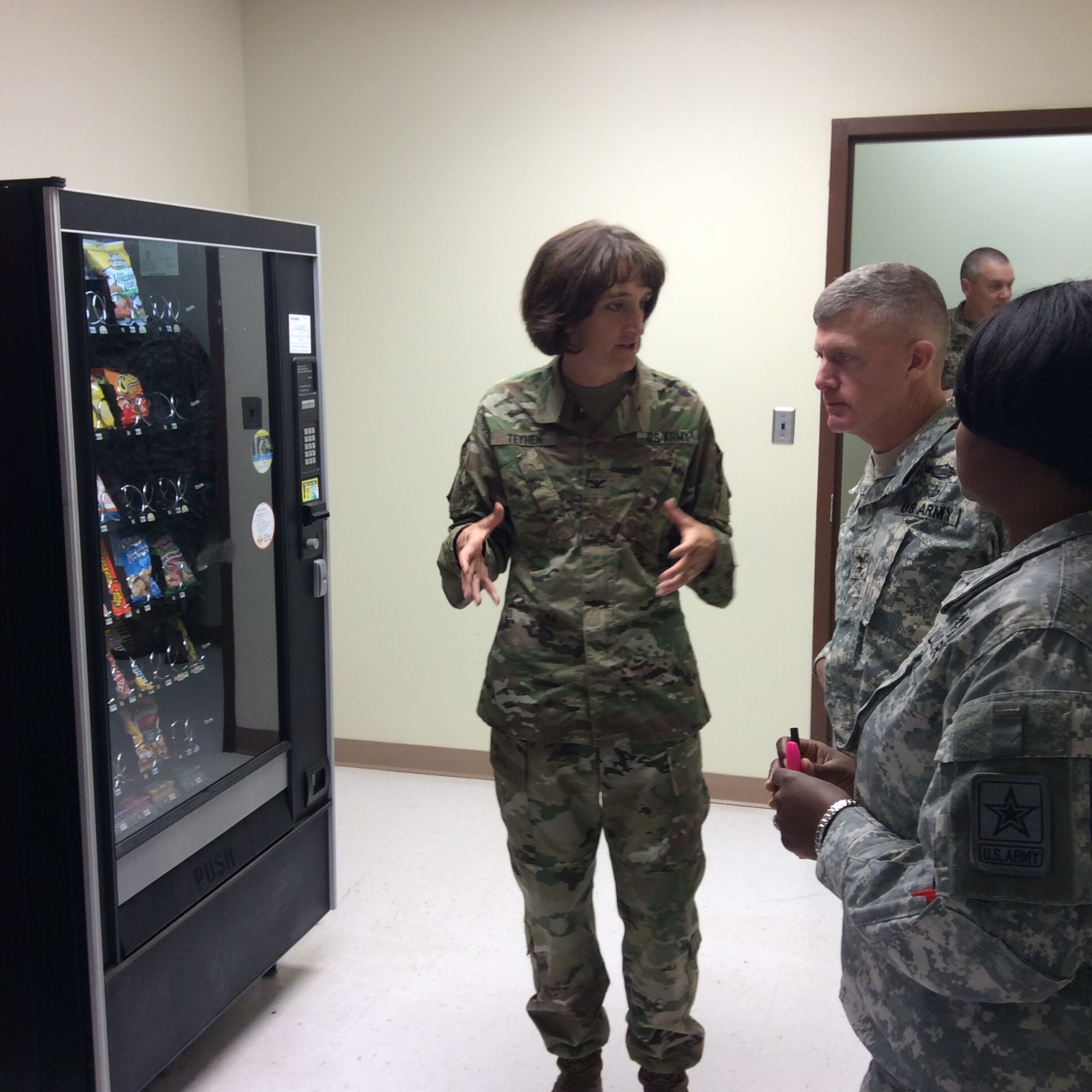
Col. Deydre Teyhen, left, director, Health and Wellness for the Office of the Surgeon General, and her deputy, Col. Tawanna McGhee, right, discuss the benefits of better nutrition with Maj. Gen. Wayne W. Grigsby Jr., 1st Inf. Div., and Fort Riley commanding general. When it comes to food, Teyhen wants the Army to make the healthy choice the easy and convenient choice.
Photo Credit: Maj. Fredrick O. Williams/Army
"Has everyone bought in? No we're not there. There's people that believe personal readiness is a personal responsibility. I believe we have to have the systems in place to make the healthy choice the easy choice. There's people that need that," Teyhen said. "We want to get to the folks that are struggling with readiness. These are the folks, the top one percent of Americans who have volunteered to defend and serve our nation, they're struggling because our whole society is struggling. This is not just a soldier problem."
Nutrition
A similarly-low percent of soldiers met all nutrition targets, with 13 percent meeting all of them and Soldiers aren't as resistant to change as some might suggest, the MEDCOM officials said. The key, she said, is the methodology and the messaging. In some cases, the healthy options simply aren't available or require extra effort or expense, so merely putting better options in more convenient and affordable reach can make an impact without the Army having to argue with soldiers. And once you start developing healthy habits, Teyhen said, the brain will adjust because "the brain craves what it is used to eating."
"We're not putting everything on the back of willpower," Teyhen said.
"One story goes: 'Don't tell me to eat a vegetable or an apple, tell me why a green apple makes me more ready,'" Ryan said. "It's not just a recommendation, because. There's a lot of thought and science."
That science, according to the report, says even five fruits and vegetable servings a day (eight are recommended) is "associated with a five-fold increase in mental well-being compared to one." And that's aside from the more commonly known benefits to better diet, like weight loss, improved blood pressure and lowered risk for cardiovascular issues and other health problems. Also, health problems don't exist in a vacuum: for example studies show sleep deprivation increases cravings for high-calorie junk foods.
Sleep
The health report found 30 percent of soldiers met some sleep targets and 55 percent did not meet any, leaving just a sliver meeting all of them. Nearly a third get less than five hours of sleep per night, a figure known to cause a variety of problems. Most get less than seven hours, which is still considered sub-optimal.
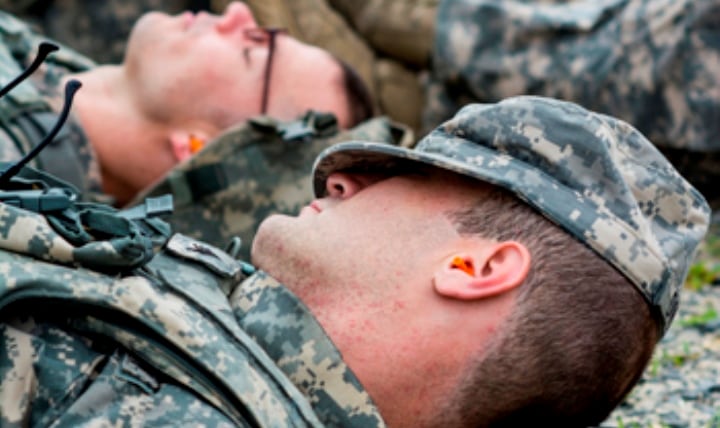
The vast majority of soldiers are not getting enough sleep, according to a report from the Army's Medical Command. The report says lack of sleep can impair a soldier's capability to a similar degree as alcohol.
Photo Credit: Sgt. 1st Class Michel Sauret/Army
Teyhen cited a 2015 study by RAND that found sleep problems common around the force, although particularly common among servicemembers who have deployed to conflict environments. That study said sleep problems can lead to short- and long-term issues including mental health problems and impairment of physical and cognitive capabilities. It recommended educational efforts to increase awareness and decrease cultural stigma, evidence-based intervention techniques, new policies encouraging sufficient rest (especially to recover after deployment), emphasis from leaders and more study of the issue.
Teyhen said she understands that soldiers have to train on operating on sleep deprivation at times and doesn't seek to change that. But "it shouldn't be a lifestyle," she said, and soldiers are not generally getting sleep by choice while leaders haven't done enough to encourage it. And she also points to studies showing that banking extra sleep before deprivation helps a lot.
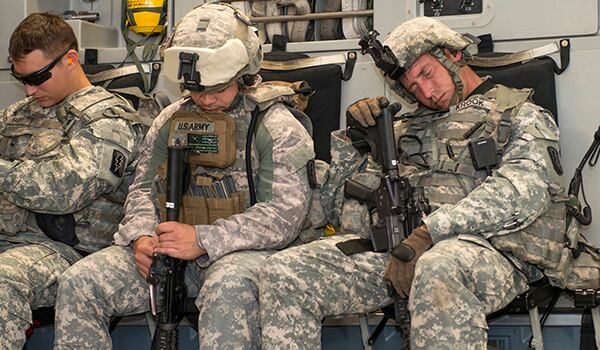
Sleep shortages, which can stem from duties but often also soldier choices, harm cognitive and physical capabilities, according to Medical Command. The Army wants a more rested and more ready force.
Photo Credit: Heide Couch/Air Force
"We are so bad at sleep," Teyhen said. "We are sleeping much worse than the average American. That has impacts on performance, weight, health, stress levels, behavioral health conditions, relationships…It's a cultural issue that we just haven't valued sleep as an organization. It is one of those epidemic problems. It leads to car accidents, it leads to errors in decision making."
The MEDCOM report said one night with less than four hours of sleep can equate to a 0.1 percent blood alcohol level (a BAC at which it's illegal to drive in most states). It also says getting less than seven hours for three days saps 20 percent from cognitive abilities, and that fatigue was a factor in 628 Army accidents and 32 soldier deaths from 2011-14. Teyhen also added that studies show something as simple as physical strength – say, your max bench press – can drop significantly on less sleep.
Exercise
While catching Zs and eating veggies, if not anathema, do not define Army life, exercise is considered a core component. And with 38 percent meeting all activity targets and another 28 percent meeting some, the area doesn't lag expectations as much as food and sleep. That doesn't mean there's no room for improvement for a habit known to improve mental capabilities and reduce stress, not to mention lower obesity rates.
While PT is regular and mandated for many, less than half of soldiers get three days of strength training a week. This despite the report's claim that soldiers using strength and cross training have up to 50 percent fewer injuries and perform better in functional testing. About a third of soldiers get less than 150 minutes of moderate aerobic exercise a week, and 43 percent get less than 75 minutes of vigorous aerobic exercise.
Part of the shortfalls can be attributed to other health areas. Working out on poor sleep or nutrition decreases the efficiency of workouts.
Another detrimental factor is smoking, which presents large health costs to the Army alongside the decreases in aerobic capacity. Teyhen said the Army has "robust tools" for people who decide they want to get tobacco out of their lives. She also took on some myths around smoking. For example, while smokers say cigarettes alleviate stress, science indicates what's really being relieved are symptoms of withdrawal form nicotine.
